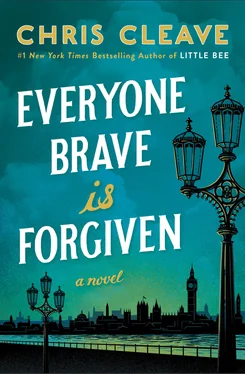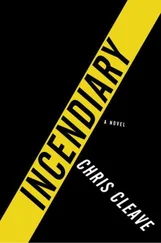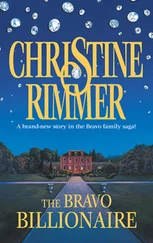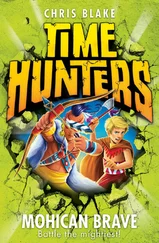But now he was making a fuss. It was hardly a medical condition, was it? One could live with a little loneliness. Men lived with ruptured gonads, with missing limbs. Men lived with their mothers-in-law, for pity’s sake. He laughed, which was better.
The doctor glanced up at him and sighed. “Look, old man, it’s war. There isn’t a pill. Find a sweet girl and forget it.”
“Thanks,” said Alistair, and went down into the street rather pleased with his prescription. He really ought to pay more attention to the whole business of courting. Even in war you were still more likely to be struck by a woman than by a bullet.
It was noon, which meant he was already late to meet Tom for lunch. He headed for Hyde Park and found that he was hurrying, which was surely a good sign. He hoped he would seem his old self to Tom — that they could pick it up where they had left off. And he was intrigued to finally meet Mary, and this friend Hilda with whom he was to be set up.
Entering Hyde Park, he entertained himself by forming a mental picture of Mary. It was rather sweet that Tom had got himself a girl. She must be steady enough for both of them, and probably thoroughly sensible. Not a head-girl type, though — he couldn’t see a woman setting her sights on Tom if she were popular enough in that way. Tom was a fine catch, of course, but perhaps for a nice girl who was herself sometimes overlooked.
No, Mary would be a practical girl with the motivation to wage what must have been a patient campaign against Tom’s tendency to overthink. She would be pretty when she smiled, although perhaps less of a looker than his besotted friend painted her in his letters. She would be round-faced with round glasses, a little solid of leg, perhaps, and with a propensity for woolens and earnestness. Mary would be a terrific girl: game, good company, the daughter of a mother who also taught and a father who worked thirty minutes a day longer than his terms of employment strictly required. She would be as poor as Tom was, and all four of them would have a jolly lunch at the modest eatery Tom had proposed in his letter. Putting off the Ritz was how Tom had phrased it.
After lunch they would all go their separate ways: Tom and Mary to an eventual marriage, Hilda to her own future, and Alistair to a rendezvous with the massed armor of the Wehrmacht.
Thinking about his imminent deployment, everything about London now moved him as never before. These mannered planes of grass in the park, those calm stone facades that rose above the bordering oaks, the ironed creases in the uniform trousers of the policeman who stood at Hyde Park Corner directing the traffic with his immaculate white armbands. All these timeless things could be seen more clearly when one had so little time oneself. In twenty-two hours he would board the train and be gone.
Back at barracks he would oversee the packing of his regiment. Every item would be documented and boxed and cataloged by the quartermaster, from the greatest artillery piece to the smallest dress-shirt stud. Then there would be the troopship: Biscay and Gibraltar, deck quoits for the officers and physical jerks for the men. Then it would all begin again: the war, with its fantastic shocks that knocked London out of a man and left him as he found himself now, with no immunity to the wonder of it.
He realized that he was standing quite still, eyes moist, halfway across Hyde Park. His pipe had gone out. He was standing by a tree. No, apparently he had taken cover by its trunk. He sweated cold. Dear god: without any fuss, and by some instinct he had picked up in France, he had found a concealed position. While his mind strayed, his body — unpiloted — had taken cover on a Saturday afternoon, as the chimes of ice cream vans sounded. Pigeons paired. Squirrels did their mummery for sandwich crumbs and nuts. The Serpentine quivered as couples in rudderless love cooled their awkward oars in it. Alistair collected himself and walked on.
A crowd was out in the park. Men in uniform nodded to him in nonchalant fraternity. Pretty things swished by in dresses, giving him warm looks from under the brims of their hats. A girl smiled at him, a knockout girl in a WAAF uniform, and it was such a companionable smile that he grinned back, and just as he was thinking of some nice way to introduce himself, her skin took on the uneasy suggestion of bubbling and scorching and her hand — reaching up to touch her hair — seemed for a moment to be splintered bones that made jagged egress through the white cotton fingers of her gloves.
“I’m sorry,” he mumbled, and hurried on.
“I’m sorry,” he said again, long after she was too far away to hear.
It happened from time to time. It was just a maddening tic, like getting a popular jingle stuck in one’s head. How one wished that all the gore had never got in there. Still, in this as in all other things, he felt certain that he would recover. The psyche, after all, could catch its breath again, as one recovered on the landing before tackling the next flight of stairs. In the meantime one could cheer oneself up, as he did now, by shooting one’s cuffs and whistling “Sleepy Lagoon.” He was still sweating cold, though, and the feeling took several minutes to pass and wasn’t entirely gone even at lunch.
The place Tom had booked was at Lancaster Gate, and it was busy. Waiters addressed corks in a good-humored frenzy and banged down the dish of the day with no more ceremony than it merited: it smelled brown, looked brown, cost one and six with a choice of dessert, and wasn’t on the ration.
Tom rose and waved from a spot by the back wall. Alistair waved back and got so involved with piloting himself and his duffel bag through the tight press of diners that he didn’t notice his friend’s companions until he reached the table. Alistair smiled his introduction to them, then nodded politely at his friend.
“Excuse me, chum,” he said. “You wouldn’t have seen a bright-looking chap, about your height, only with a sorry excuse for a beard?”
Tom stroked his jaw. “It has grown in rather obligingly, don’t you think? And look at you! You look…”
“I know!” said Alistair. “At least twenty years younger. It’s the fresh air.”
They shook hands, and Alistair snatched another look at the women while he hung his jacket on the back of his seat. He had been right about Mary: she was a little slimmer than he had guessed, but there were the glasses — round, just as he had pictured them — and here was the button nose in the pretty round face that smiled at him now, under nice black hair in a modish pompadour that was fun if a bit over the top. She seemed a charming girl, and he was delighted for Tom.
The other woman was a knockout, a redhead with peppy green eyes and a reckless, puckish stamp. Her hands fussed with her napkin. This must be Hilda. She smiled at him gaily, and he realized with a kick of nerves that he didn’t entirely mind it. He saw now how it would all happen: after lunch someone would casually suggest the theater, and naturally he and she would be seated together, and then afterward they would all go to the dances.
She held his eye, nicely and without flirtation, and yet he felt that an acknowledgment was passing between them.
But now his stomach fell. He could not explain to himself the awful ache of melancholy that her simple, chummy smile provoked in him. A man ought to be glad. But her freckled face burned to bones before his eyes. Even when he blinked and her beauty was restored, his morale was left in ashes. In twenty-one hours he would be gone, and he guessed now — by the leaden sadness that her beauty provoked — that he would never return. He broke off the glance, steadied himself, and looked to Tom.
“I’d like you to meet Mary,” Tom said, putting his arm around the woman Alistair had just been felled by.
Читать дальше












